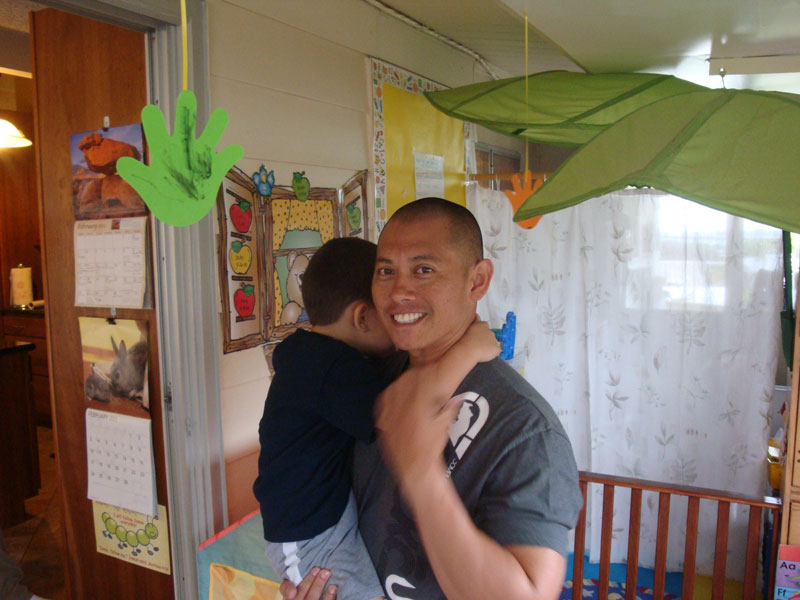Child care access helps parents and children succeed
The Office of Child Care (OCC) is pleased to announce the release of an Information Memorandum describing opportunities for Child Care and Development Fund (CCDF) lead agencies to make child care assistance work better for student parents. Helping parents succeed in furthering their education benefits families in two ways: (1) higher education levels for parents mean they are more likely to earn higher wages, and (2) those higher levels strongly predict better rates of school readiness for their children.
When Congress updated the Child Care and Development Block Grant (CCDBG) Act with bipartisan support in 2014, they made changes to help it work better for children and their parents together. Key purposes of the CCDBG Act now include improving child development, maximizing parents’ options for high-quality child care, and supporting parents in trying to achieve independence from public assistance. A focus on helping student parents access child care helps meet these purposes.
In today’s economy, the cycle of poverty is difficult to escape without education and training. According to the U.S. Department of Labor, median weekly earnings for someone with less than a high school degree are $493 compared with $798 for those with an associate degree or $1,137 for those with a bachelor’s degree. However, the lack of access to affordable and stable child care that meets their children’s needs can keep parents from enrolling in or completing educational programs that would improve family economic mobility. According to a study from the Institute for Women’s Policy Research, 4.8 million college students were parents of dependent children in 2011. Those students made up approximately 26 percent of all undergraduates in 4-year colleges that year. Seventeen percent of community college students are single parents, and a significant percentage of them attend school while working full or part time. Yet, the number of campus child care slots is shrinking across the country.
The good news is that 48 States and Territories reported in their CCDF Plan for fiscal years (FY) 2016–2018 that their policies allow parents to qualify for CCDF program assistance on the basis of some kind of education and training participation alone, and 8 require a combination of them with work.* However, the percentage of parents who qualify for child care assistance based on education and training or a combination of them with work has actually declined slightly since 2012. According to data from FY 2014, the most recent data available, 8 percent of parents qualified for CCDF program assistance due to education or training, and an additional 8 percent qualified due to education or training combined with employment. It is also true that State policies vary on which types of education and training parents are allowed to pursue and take part in to qualify for child care assistance.
This new resource lays out ideas and examples for CCDF lead agencies to consider when making child care assistance work better for student parents, including:
- Allow student parents to qualify for child care assistance without significant additional work-hour requirements and other conditions.
- Allow child care assistance for the full range of education programs.
- Provide child care during schedule breaks and associated times related to education participation.
- Coordinate with higher education entities.
- Build the supply of campus-based and campus-linked child care and school-age care.
- Ensure that student parents are aware of child care options.
The CCDF program has the potential to help two generations on their pathway to economic mobility and success. OCC hopes this resource will be useful to our State, Territory, and Tribal partners in their continued efforts to serve children and families.
* State and Territory CCDF Plans for Fiscal Years 2016 to 2018. Retrieved from: http://www.acf.hhs.gov/occ/resource/state-plans.
Office of Child Care
Administration for Children and Families
U.S. Department of Health and Human Services
Mary E. Switzer Building, Fourth Floor, MS 4425
330 C Street, S.W.
Washington, DC 20201
General office number: (202) 690-6782
Fax: (202) 690-5600
General e-mail: occ@acf.hhs.gov
Web site: http://www.acf.hhs.gov/programs/occ
If this message was forwarded to you and you would like to receive future announcements from the Office of Child Care, please complete the online form. You should receive a confirmation e-mail.
You can update your profile at any time by clicking here. You will need to enter your e-mail address to receive a link that provides access to your information. Current subscribers can also be removed from the OCC announcements distribution at any time by clicking here. When you enter your e-mail address, you will receive a link to delete your profile.
The text, accompanying graphic artwork, and/or attachments in this e-mail comply with the Section 508 Amendment to the Rehabilitation Act of 1973.

